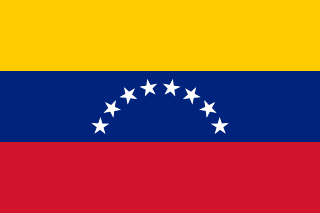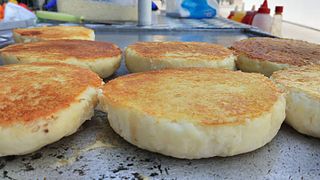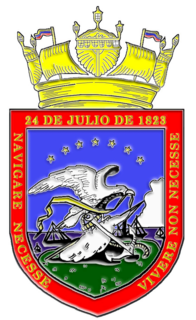
Venezuela, officially the Bolivarian Republic of Venezuela, is a country on the northern coast of South America, consisting of a continental landmass and many islands and islets in the Caribbean Sea. It has a territorial extension of 916,445 km2, and the population of Venezuela was estimated at 28 million in 2019. The capital and largest urban agglomeration is the city of Caracas.

The economy of Venezuela is based largely on the petroleum and manufacturing sectors and has been in a state of total economic collapse since the mid-2010s. Venezuela is the sixth largest member of OPEC by oil production. Since the 1920s, Venezuela has been a rentier state, offering oil as its main export. The nation has experienced hyperinflation since 2015.

Hugo Rafael Chávez Frías was a Venezuelan politician who was president of Venezuela from 1999 until his death in 2013, except for a brief period in April 2002. Chávez was also leader of the Fifth Republic Movement political party from its foundation in 1997 until 2007, when it merged with several other parties to form the United Socialist Party of Venezuela (PSUV), which he led until 2012.

Caracas, officially Santiago de León de Caracas, abbreviated as CCS, is the capital and largest city of Venezuela, and the center of the Metropolitan Region of Caracas. Caracas is located along the Guaire River in the northern part of the country, within the Caracas Valley of the Venezuelan coastal mountain range. The valley is close to the Caribbean Sea, separated from the coast by a steep 2,200-metre-high (7,200 ft) mountain range, Cerro El Ávila; to the south there are more hills and mountains. The Metropolitan Region of Caracas has an estimated population of almost 5 million inhabitants.

Simón José Antonio de la Santísima Trinidad Bolívar y Ponte Palacios y Blanco, generally known as Simón Bolívar and also colloquially as El Libertador, "the Liberator", was a Venezuelan military and political leader who led what are currently the countries of Venezuela, Bolivia, Colombia, Ecuador, Peru, and Panama to independence from the Spanish Empire.

The Orinoco is one of the longest rivers in South America at 2,250 kilometres (1,400 mi). Its drainage basin, sometimes known as the Orinoquia, covers 880,000 km2 (340,000 sq mi), with 76.3 percent of it in Venezuela and the remainder in Colombia. It is the fourth largest river in the world by discharge volume of water. The Orinoco River and its tributaries are the major transportation system for eastern and interior Venezuela and the Llanos of Colombia. The environment and wildlife in the Orinoco's basin are extremely diverse.
The bolívar soberano has been the official currency of Venezuela since 20 August 2018.

The National Assembly is the legislature for Venezuela that was first elected in 2000. It is a unicameral body made up of a variable number of members, who were elected by a "universal, direct, personal, and secret" vote partly by direct election in state-based voting districts, and partly on a state-based party-list proportional representation system. The number of seats is constant, each state and the Capital district elected three representatives plus the result of dividing the state population by 1.1% of the total population of the country. Three seats are reserved for representatives of Venezuela's indigenous peoples and elected separately by all citizens, not just those with indigenous backgrounds. For the 2010 to 2015 the number of seats was 165. All deputies serve five-year terms. The National Assembly meets in the Federal Legislative Palace in Venezuela's capital, Caracas.

Miss Venezuela is the national beauty pageant of Venezuela, traditionally held in September. It is preceded by two or three months of preliminary events, with the awarding of corporate prizes. The final televised competition generally lasts about four hours and is broadcast live across Latin America by Venevisión and produced by the networks parent company Cisneros Group, with edited versions to the United States and Mexico on the Univision and Telemundo networks. From 2013 to 2015, the national contest was split into two separate pageants: Miss Venezuela and Miss Venezuela Mundo. The pageant is also closely observed by other countries seeking to level competition due to its illustrious record of pageant victories. In 2016, the Venezuelan franchise for Miss Earth was awarded to Miss Earth Venezuela organized by National Directors Julio César Cruz and Alyz Henrich.

Arepa is a type of food made of ground maize dough, originating from the northern region of South America in pre-Venezuelan times, and is notable primarily in the cuisines of Colombia and Venezuela, but also present in the cuisines of Bolivia and other countries.
Venezuelan cuisine is influenced by its European, West African, and Native American traditions. Venezuelan cuisine varies greatly from one region to another. Food staples include corn, rice, plantains, yams, beans and several meats. Potatoes, tomatoes, onions, eggplants, squashes, spinach and zucchini are also common sides in the Venezuelan diet. Ají dulce and papelón are found in most recipes. Worcestershire sauce is also used a frequently in stews. Venezuela is also characterized for having large variety of white cheese, usually name by geographical region.

The Bolivarian Navy of Venezuela, commonly known as the Venezuelan Navy, is the naval branch of the National Bolivarian Armed Forces of Venezuela.

The Captaincy General of Venezuela, also known as the Kingdom of Venezuela, was an administrative district of colonial Spain, created on September 8, 1777, through the Royal Decree of Graces of 1777, to provide more autonomy for the provinces of Venezuela, previously under the jurisdiction of the Audiencia of Santo Domingo and then the Viceroyalty of New Granada. It established a unified government in political (governorship), military, fiscal (intendancy), ecclesiastical (archdiocese) and judicial (audiencia) affairs. Its creation was part of the Bourbon Reforms and laid the groundwork for the future nation of Venezuela, in particular by orienting the province of Maracaibo towards the province of Caracas.

Nicolás Maduro Moros is a Venezuelan politician and president of Venezuela since 2013, with his presidency under dispute since 2019.

The history of the Jews in Venezuela dates to the middle of the 17th century, when records suggest that groups of marranos lived in Tucacas, Caracas and Maracaibo. The Jewish community, however, did not become established in Venezuela until the middle of the 19th century. Since Hugo Chávez took power in 1999, tension has existed between the government and Jewish population, which has seen large numbers emigrating. Today, the majority of Venezuelan Jews live in Israel, while modern-day Venezuela continues to host a modest Jewish population.

Relations between Cuba and Venezuela were established in 1902. The relationship deteriorated in the 1960s and Venezuela broke relations in late 1961 following the Betancourt Doctrine policy of not having ties with governments that had come to power by non-electoral means. A destabilizing factor was the Cuban support for the antigovernment guerrilla force that operates in remote rural areas. In 1999 the bilateral relation significantly improved during the Presidency of Hugo Chávez. Chávez formed a major alliance with Cuban president Fidel Castro and significant trade relationship with Cuba since his election in 1999. The warm relationship between the two countries continued to intensify. After decades of close ties in the Caribbean, several governments in the region started to distance from the United States. Hugo Chávez described Castro as his mentor and called Cuba "a revolutionary democracy".

The Crisis in Venezuela during the Bolivarian Revolution is an ongoing socioeconomic and political crisis that began in Venezuela on 2 June 2010 during the presidency of Hugo Chávez and has continued since. It is marked by hyperinflation, escalating starvation, disease, crime and mortality rates, resulting in massive emigration from the country. According to economists interviewed by The New York Times, the situation is the worst economic crisis in Venezuela's history and the worst facing a country in peace time since the mid-20th century and is more severe than that of the United States during the Great Depression, of the 1985–1994 Brazilian economic crisis, or of the 2008–2009 hyperinflation in Zimbabwe. Other American writers have also compared aspects of the crisis such as unemployment and GDP contraction to Bosnia and Herzegovina after the 1992–1995 Bosnian War as well as Russia, Cuba and Albania following the collapse of the Eastern Bloc in 1989.

Juan Gerardo Guaidó Márquez is a Venezuelan politician, a former member of the social-democratic Popular Will party, federal deputy to the National Assembly representing the state of Vargas. On 23 January 2019, Guaidó and the National Assembly declared he was acting President of Venezuela, starting the Venezuelan presidential crisis by challenging Nicolás Maduro's presidency.

A crisis concerning the identity of the legitimate president of Venezuela has been underway since 10 January 2019, with the nation and the world divided in support for Nicolás Maduro or Juan Guaidó. The process and results of the 20 May 2018 presidential election were widely disputed. The opposition-majority National Assembly declared Maduro a "usurper" of the presidency on the day of his second inauguration and disclosed a plan to set forth its president Guaidó as the succeeding acting president of the country under article 233 of the Venezuelan Constitution. A week later, the Supreme Tribunal of Justice declared that the presidency of the National Assembly was the "usurper" of authority and declared the body to be unconstitutional.

















